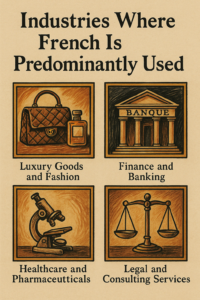In today’s globalized business environment, English often serves as the lingua franca. However, in France, proficiency in French remains indispensable for professional success. While many younger professionals are conversant in English, initiating conversations in French can foster deeper connections and demonstrate respect for local culture.
French in the Workplace: A Gateway to Professional Success

Engaging in French within the workplace is not merely a matter of etiquette; it plays a crucial role in effective communication and integration. Even in multinational corporations where English is prevalent, internal communications, official documents, and meetings often occur in French. This is particularly evident in:
- Legal and Administrative Affairs: Navigating France’s legal and bureaucratic systems necessitates a strong command of French to comprehend regulations and procedures accurately. The Toubon Law mandates the use of French in workplace documents, underscoring its importance in legal contexts.
- Corporate Communications: Internal memos, reports, and informal discussions frequently utilize French, underscoring its importance for seamless collaboration. As noted by BusinessCulture.org, the French express themselves with more gestures and emphasis, reflecting their communication style.
- Government and Public Relations: Interfacing with governmental bodies and public institutions typically requires proficiency in French to ensure clear and effective communication.
Industries Where French is a Key Business Language
While some industries may operate with English as a primary language, several sectors in France maintain French as their core medium of communication:

- Luxury Goods and Fashion: Companies like LVMH and Chanel conduct their operations predominantly in French, reflecting the language’s association with elegance and sophistication.
- Finance and Banking: Institutions such as BNP Paribas and Société Générale often prefer French for internal communications and client interactions.
- Healthcare and Pharmaceuticals: Organizations like Sanofi engage in French for research, development, and regulatory affairs, ensuring precision in complex medical terminology.
- Legal and Consulting Services: Firms operating within France’s legal framework rely on French to draft documents, negotiate contracts, and advise clients effectively.
Advantages of French Proficiency in Business
Beyond functional communication, possessing French language skills offers several strategic benefits:

- Enhanced Networking: Participating in French-language discussions and events can lead to stronger professional relationships and expanded opportunities.
- Cultural Competence: Understanding and utilizing French nuances, idioms, and formalities can improve interactions and demonstrate cultural awareness.
- Competitive Edge: Professionals proficient in French are often more attractive to employers seeking individuals capable of navigating both local and international contexts.
In conclusion, while English serves as a global bridge, French remains deeply ingrained in France’s business practices. Demonstrating proficiency in French not only facilitates daily operations but also signals a commitment to engaging with the local culture and market.
At Feel Good French, we specialize in tailored language training programs designed to meet the specific needs of professionals. Our courses focus on practical language skills that enhance your effectiveness in French-speaking business environments.
Investing in French language proficiency is not merely about learning a language; it’s about opening doors to new opportunities and building meaningful connections in the French business world.
What happens on the 2nd of February in France?
February 2nd in France sits in the Carnival season. Americans know Mardi Gras. This is…
She Didn’t Just Move to Provence. She Learned to Belong.
Interview with Carolyne Kauser-Abbott, Founder of Perfectly Provence Some people fall in love with Provence…
Beyond Strasbourg & Colmar: 5 Unexpected French Christmas Markets to Visit in 2025
December in France is more than a season. It is an atmosphere (une ambiance). A…
Moving to Fontainebleau: The Real Story of Janice in France
When Janice Deerwester says “Bonjour!” on her YouTube channel, her Texas accent still peeks through….
Go to the Bank in France: The American Expat’s Guide to French Banking
Moving to France as an American means discovering new food, new culture, and—yes—new bureaucracy. One…
French Clothing Sizes in US: A Clear Guide for American Expats
Your first weeks in France are a string of small delights and quick puzzles. The…







